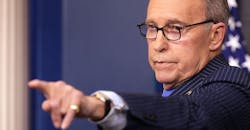Kudlow Says US Ready to Extend China Talks by Weeks or Months
The Trump administration is prepared to keep negotiating with China for weeks or even months to reach a trade deal that will ensure the world’s second-largest economy improves market access and intellectual-property policies for U.S. companies, a senior American official said.
“This is not time-dependent. This is policy- and enforcement-dependent,” White House economic adviser Larry Kudlow said in a speech in Washington on Thursday. “If it takes a few more weeks, or if it takes months, so be it. We have to get a great deal, as the president says, that works for the United States. That’s our principal interest.”
U.S. Trade Representative Robert Lighthizer and Treasury Secretary Steven Mnuchin met with Chinese negotiators in Beijing for a working dinner on Thursday and they’ll participate in a full day of talks on Friday. The discussions will continue next week when China’s trade czar, Vice Premier Liu He, will travel to Washington to meet with U.S. negotiators as well as President Donald Trump, according to Kudlow.
The key areas where the U.S. is demanding better terms include China improving treatment of U.S. intellectual property, opening up market access for American companies and agreeing on an enforcement mechanism for the trade deal, Kudlow said. The U.S. has proposed regular meetings to assess whether China is living up to promises of reform in the pact, he said. The Trump administration wants to be able to impose tariffs on China -- with no threat of counter-retaliation -- if China fails to hold up its ends of the bargain, he said.
“We are getting close, but we are not there yet,” Kudlow said.
The burst of diplomacy suggests both sides remain determined to reach an agreement that would avoid any escalation of the eight-month trade war that has seen them impose duties on $360 billion of each others’ imports. China wants the U.S. tariffs imposed on Chinese goods lifted but Trump said last week the duties would remain in place for a “substantial period of time.”
Kudlow on Thursday said the U.S. may lift some of the tariffs on Chinese goods, but not all. “We’re not going to give up our leverage,” Kudlow said. “It doesn’t necessarily mean that all of the tariffs would be kept in place. Some of the tariffs would be kept there. Again, when Bob Lighthizer comes back, he will illuminate all of us on that. That’s part of the negotiations and we’ll see."
On the possibility of auto tariffs, Kudlow said the Commerce Department has sent to Trump a variety of recommendations in a report over whether vehicle imports pose a threat to national security. The finding, handed over to Trump in February, have been kept private.
The president may take longer than 90 days to decide whether to act on the recommendations, said Kudlow, without elaborating. Under the so-called Section 232 trade law invoked for the probe, Trump has 90 days from receiving the report to respond, but there’s ways for him to extend that period for further review.
“We are going to follow the process,” said Kudlow.
By Sarah McGregor and Kevin Cirilli
About the Author
Bloomberg
Licensed content from Bloomberg, copyright 2016.
